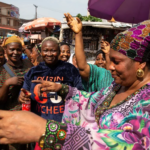Following the despairing number of Nigerians that died of tuberculosis in 2020 (156,000 out of 452,000 victims, according to the WHO), four non-profit organizations have launched sustainable tuberculosis (TB) service delivery projects in five Nigerian states.
These disturbing figures represent 4.6% of the TB burden across the world, putting Nigeria at the top of the disease prevalence in Africa in 2022.
Called the FundTB Project, the project aims to power TB service delivery through increased domestic investment in Anambra, Akwa Ibom, Cross River, Delta, and Imo States. Together with creating TB budget lines, the intervention will influence policies relating to the allocation and release of TB funds, extend state health insurance to TB patients and enhance TB services through resource support and collaboration with the private sector.
The NGOs—Policy Alert; Gender Perspective and Social Development Center (GPSDC); Center for Healthworks, Development and Research Initiative (CHEDRES); Concern for Women and Youth Empowerment (COWOYEM); and Initiative for the Prevention and Control of Diseases (IPCD)—announced that the six-month FundTB Project would employ research, campaigns, capacity building and policy advocacy.
“This project is essential due to the alarming TB statistics in Nigeria. Reversing this situation requires massive health investment by the federal and state governments, with a specific focus on TB financing,” read a statement signed by Tijah Bolton-Akpan, the executive director of Policy Alert.
The organisations emphasised the underfunding of TB programmes, which restricts comprehensive prevention, diagnosis, treatment and public awareness campaigns against this highly infectious and potentially fatal disease. Current government funding for TB interventions in Nigeria is less than 10%, placing a significant burden on donors and international partners.
“This scenario has left a funding gap of 70% hampering efforts to stem the tide of prevalence and to provide care for those infected. It is unsustainable to leave the burden of TB financing for donors and development partners, necessitating a different approach to public financial management to free up more resources to close the funding gap,” Bolton-Akpan added.
A key objective of the project is to engage the private sector to donate equipment for TB treatment, build new facilities, provide nutritional support to patients and increase overall funding for improved TB services in the country.
The FundTB project is supported by the United States Agency for International Development (USAID) through the Palladium Group.
In response to the high number of tuberculosis (TB) deaths in Nigeria in 2020 (156,000 out of 452,000 victims), four non-profit organizations have launched the FundTB Project aimed at enhancing TB service delivery in five Nigerian states: Anambra, Akwa Ibom, Cross River, Delta, and Imo.
This project seeks to increase domestic investment, create budget lines specifically for TB, influence funding policies, integrate TB treatments into state health insurance, and enhance TB services through collaborations with the private sector. The six-month initiative involves research, campaigns, capacity building, and policy advocacy, highlighting the need for federal and state governments to invest more in TB financing.
The NGOs stressed the underfunding of TB programs, which hinders comprehensive prevention, diagnosis, treatment, and public awareness campaigns. Current government funding covers less than 10% of the required amount, leaving a significant gap filled by donors.
A major goal is to engage the private sector for equipment donations, facility building, nutritional support for patients, and increased TB service funding, with support from the United States Agency for International Development (USAID) through the Palladium Group.






